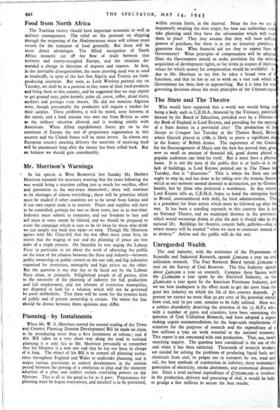Food from North Africa
The Tunisian victory should have important economic as well as military consequences. The relief on the pressure on shipping through the reopening of the Mediterranean route will release more vessels for the transport of food generally. But there will be more direct advantages. The Allied occupation of North Africa instantly cut off the flow of trade between that territory and enemy-occupied Europe, and the situation de- manded a change in direction of imports and exports. At first, in the inevitable disorganisation, the more pressing need was to send in foodstuffs, in spite of the fact that Algeria and Tunisia are food- producing countries. But soon, as Lord Wootton .pointed out on Tuesday, we shall be in a position to buy some of their food-products and bring them to this country, and he suggested that we may expect to get ground nuts, palm kernels, palm oil, cocoa, coffee, dried fruits, sardines and perhaps even Onions. He did not mention Algerian wine, though presumably the producers will require a market for their surplus. These problems, it will be noted, were foreseen at the outset, and a food mission was sent out from Britain as soon as the military situation allowed, and is working jointly with Americans. When Allied expeditionary forces get on to the continent of Europe the test of preparatory organisation in this country and the United States will be more severe. In almost any European country awaiting delivery the necessity of receiving food will be paramount long after the enemy has been rolled back. But on balance we should gain considerably.


























 Previous page
Previous page